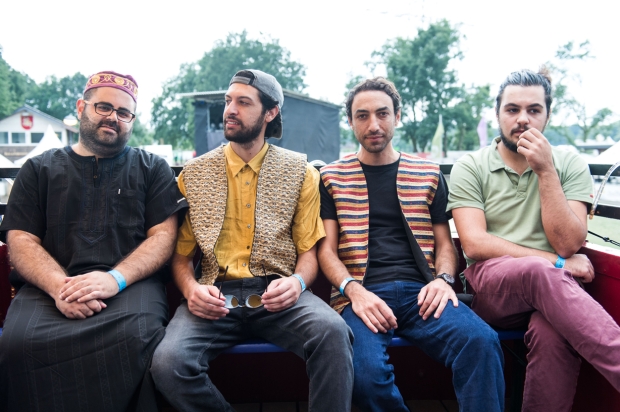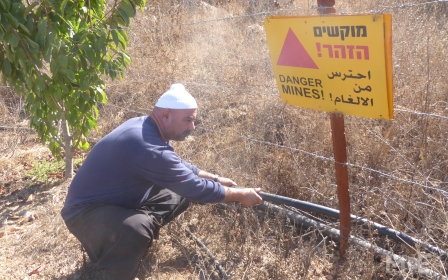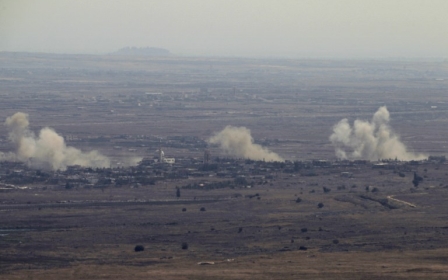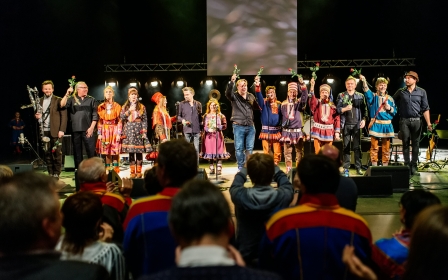Straight out of Golan: The roots rockers bringing Arab groove to the UK
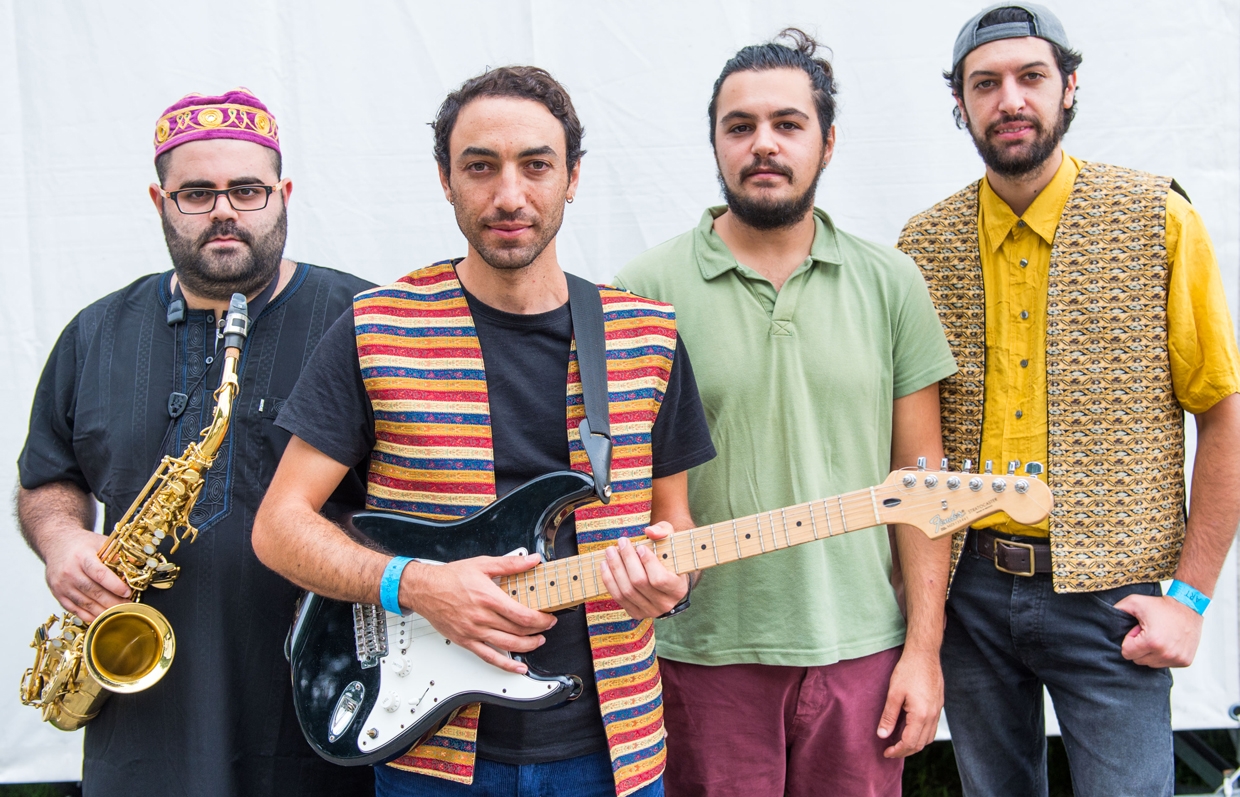
LONDON - “UNDEFINED”: the nationality status written in capitals in the red document – the laissez passer - which Hasan Nakhleh, like other Golan residents, travels on. That word might also describe the infectious fusion that his band TootArd is bringing to the UK this month.
TootArd, Arabic for strawberries, is a “mountain rock reggae” band from the remote village of Majdal Shams in the Occupied Syrian Golan Heights. Now Europe beckons.
As west London rocked and swayed to the carnival this August bank holiday, on the east side of town in a small venue in Hackney, a crowd danced and whooped to a musical melting pot of Arabic jazz, rock and reggae.
The enthusiastic crowd responds to lead singer Hasan’s salam a-laikum with a united wa laikum salam. But just when the audience seems to have caught the TootArd groove, it subtly carries them somewhere else.
Yes, that is a north African Touareg blues riff now rocking the venue, a powerful influence on their work. TootArd are at home in the borderlands between musical definitions and all the more exciting for it.
Bassist Shadi Awidat teases his strings on a later track, evoking hinterlands of jazz and rock, but never straying from the pulsating beat. Some kind of love affair is breaking out in east London tonight.
'Being born stateless, living your life, growing up, doing everything, dying stateless. On paper we are not Israeli, we are not Syrian'
- Hasan Nakhleh, singer and guitarist, TootArd
Laissez Passer is the title of TootArd’s new album, a definition of statelessness that they have made their own through music that does not fit into any fixed category – except the one that lifts your mood and moves your feet.
“We are trying to make our own sound. We don’t represent modern Arabic alternative music – I don’t even know how this should be or sound like,” quietly spoken singer and guitarist Hasan laughs. “We find it very hard where to fit into a genre even.”
“I think what Laissez Passer is saying is not complicated, it’s basically simple … This travel document – it’s a special thing we have. Being born stateless, living your life, growing up, doing everything, dying stateless. On paper we are not Israeli, we are not Syrian.”
Borderland band
All the band members were born two decades or more after the 1967 occupation of Golan by Israel. The vast majority of Golan’s Druze minority residents rejected Israeli citizenship when it was offered in 1981, an act of collective resistance that saw the Israeli army surround and later occupy Golan villages and arrest many.
This long campaign of resistance and strikes means that today they cannot vote in Israel, but they are also exempt from military service, marking them out from the more assimilated Druze of Israel. “The people of Golan said no thanks, we are Syrian. It’s a political thing,” says drummer Rami Nakhleh, who is also Hasan's brother.
But there is no prospect of Golan returning to Syria because of occupation and the bloody Syria war since 2011. “Right now this question is very hard,” says Hasan, “but this area belongs to Syria and, in international law, it is Syrian and it is occupied, it is not recognised as Israel. But we pay taxes and we work there as Israeli permanent residents, not citizens. We are allowed to work and study in university in Israel as normal.”
Laissez Passer means "Let him pass" in French. But in the case of the Golan band, that is often not the case. Part of the reason they are promoting their new album in Europe is that the doors to most neighbouring countries are closed.
While they have played in Amman and Cairo, they are blocked from playing in most of the Arab world because their documents are issued by Israel. As a result, the legions of fans they have won through the internet in Lebanon, Syria, the Gulf and north Africa cannot see them play live.
“To be international we have to come here to Europe because in the Middle East we can't travel around,” says Hasan.
“What is happening on this tour is we are being introduced to a totally new crowd at the festivals. Nobody knows us. We sing in Arabic, people dance and have fun.”
For the band, the last six months have been a whirlwind. In February, they began recording the new album. In April, the band took part in the Palestinian Expo show in Ramallah, and were promptly signed up by German label Glitterbeat Records and a UK booking agent, leading to this summer’s tour.
Musical family
Hasan and brother Rami are the band's songwriters and have played together since childhood. They grew up listening to their father playing the oud and their older brother playing the qanoun, a traditional harp-like instrument.
While learning classical instruments under a Russian teacher, the Nakhleh brothers first met saxophonist Mdah and bassist Awidat.
“As teenagers we started listening to rock, The Beatles and this kind of stuff, Bob Marley. When we discovered reggae it was like ‘wow’,” says Rami.
“We called these guys [Mdah and Awidat] - we were all in high school, and we started a band, which could move from instruments like darbuka to drums, and I also had my guitar. We adapted the rock instruments – bass, guitar, drums – and we started to rehearse in our house and play covers of Bob Marley. And this is the first performances we did in the village, doing covers. The more we played Bob Marley, the more we learned how to build a song and a groove.”
While some members have come and gone, these four remain. Their love of roots, reggae and jazz is unmistakable on their first 2011 album, Nuri Andaburi.
Over the years, the band became a much-loved part of the Palestinian music scene, playing to audiences in Haifa, Jerusalem, Nazareth and Ramallah. Then in 2014 the band took a pause from performing to pursue personal projects, while Hasan moved to Switzerland. "We felt we needed some time to refresh, musically and personally. And to continue the search in the music," explains Hasan.
Now they are back together and they’ve set their sights on Europe.
Despite the distance between the brothers, Rami and Hasan both visited one another in the writing phase of Laissez Passer, then they got together back in Golan for an intensive two-week rehearsal and recording period with the other two band members. “We started recording in our home studio,” says Rami, “then in Jerusalem, and Haifa.”
Unwilling ambassadors
At the gig, alto sax player Mdah plays the same instrument that John Coltrane and Charlie Parker once did, but with a quarter-tone scales that brings a new character to the music.
Hasan explains how this quarter tone, and a certain attitude to the music and rhythm, is what allows the group to play their instruments in such a way that the Arabic roots of the music ring out. “Melodically we are trying to be Arabic, but the groove is international.”
The new album is the result of seven years of trying to create a sound of their own, says Rami. “After the first time we wanted to write a song, we started to experiment. We discovered rock and jazz, then we heard African music.”
Saharan Touareg blues kings Tinariwen are a favourite and a big influence on their work. “We play the Arabic scales but somehow it is similar [to Touareg blues and rock], we love the way they play the electric guitar,” says Hasan.
'We are artists, not activists. When people see us they will have a different view [of Arabs] but we don't make it our goal'
- Hasan Nakhleh, singer and guitarist, TootArd
This week in London, TootArd are excited to be playing alongside Mdou Moctar, a Touareg singer and guitarist from Niger, before heading to a gig in Maidstone on Friday and the End of the Road festival in Salisbury, southwest England, on Sunday. After this they return for another tour of Golan and Palestine, and then onward to Morocco for the Visa for Music showcase event for Middle Eastern and African bands in November.
As for the political content of their songs and any idea that they might be ambassadors of understanding between the Arab world and the West, they are not so sure. “I think we are artists, not activists,” says Hasan. “I feel it will happen not in a direct way. I know also that a lot of people when they see Arabs and they have a different view, it will probably do something, but we don’t make it our goal.”
“For me personally, it is more about the music. But we are aware that it could change a lot of minds,” adds Rami.
TootArd’s new album Laissez Passer will be released on 10 November on Glitterbeat Records. They play on Thursday 31 August at Cafe OTO, 18–22 Ashwin Street, Dalston, London E8 3DL. Playing Shemomedjamo Festival, Mote Park, Maidstone Friday 1 September, and End of the Road Festival, Larmer Tree Gardens, Salisbury, Sunday 3 September, 12:45pm.
New MEE newsletter: Jerusalem Dispatch
Sign up to get the latest insights and analysis on Israel-Palestine, alongside Turkey Unpacked and other MEE newsletters
Middle East Eye delivers independent and unrivalled coverage and analysis of the Middle East, North Africa and beyond. To learn more about republishing this content and the associated fees, please fill out this form. More about MEE can be found here.


